Batman Begins initially disappointed me. All cinematic legends of the Dark Knight inevitably do, save those told by Paul Dini and Co.. I can remember leaving the theater in late 2005 with my Ambassador on my arm. She turned to me and said, “Somebody forgot to tell them they weren’t making Spider-Man.”
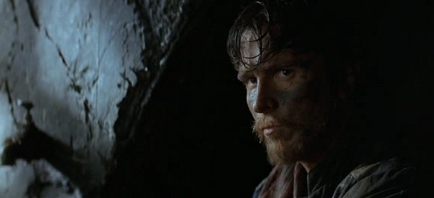
Looking back now (after the abysmal failure of Spider-Man 3, the X-Men and Hulk sequels, and the endless parade of second rate cartoons Marvel’s churned out over the years) I realize how unfair this was to director Christopher (Memento) Noland, writer David S. (Blade) Goyer, and even Our Hero, Christian Bale. All did the best they could, and a much better job than anyone had any right to expect given the Bat’s long, largely-depressing, big screen history. This movie went through all eight levels of Development Hell, its makers fighting wars and rumors of wars that no doubt weighted on my mind as I stepped into the the theater, clouding judgment already hustled by my twenty years of comic-reading. I would’ve found fault with the best Bat-picture in the world and Batman Begins is far from that. It is, however, the second best Batman film in thirty years, easily surpassing Tim Burton’s efforts.
After a credit-less, surrealist intro, we dissolve to stately Wayne Manor, a Georgian nightmare overlooking the Wayne family fiefdom of Gotham City. (It’s like Versailles and the English House of the Parliament had a torrid love affair, birthing this ungainly bastard of a house.) Young Bruce Wayne (Gus Lewis), age 8, plays in the garden area with his family’s housekeeper’s daughter, Rachel Dawes (Emma Lockhart). Their hide-and-seek leads Bruce to the rotted-out old covering of an ancient wellhead, through which he promptly falls. At the bottom, a swarm of bats rises to great the young Wayne, scratching destiny into the boy’s arms and face.
Rescued by his father, Dr. Thomas Wayne (Linus Roache), young Bruce recovers…or seems to, at least. Bats haunt his dreams and intrude into his waking moments, inducing minor panic attacks, like the one that grips him during the opera his parents drag him to one night. Prompted by the boy’s sudden irrationality, Thomas, Martha and Bruce exit out the side, into an alley.
A man named Joe Chill (Richard Brake) waits for them, gun in hand. He demands Thomas’ wallet and Martha’s pearls as Bruce watches from his mother’s arms. Joe Chill gets what he wants…and fires twice, leaving both Waynes dead at their son’s feet before fleeing into the night. Thomas Wayne’s last words are, “Don’t be afraid,” words the boy will need at least eighteen years to fully comprehend.
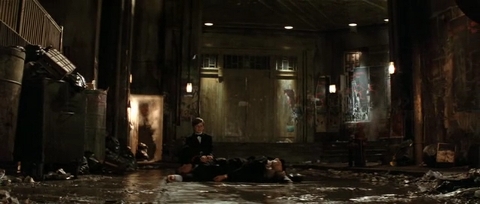
After said time Bruce (now played by Christian Bale) receives word Joe Chill will soon be free on appeal. Seems the small-time punk shared cell space with big time mob boss Carmine “The Roman” Falcone (Tom Wilkinson). This Bruce, home from Princeton, learns from Rachel, now a crusading Assistant D.A. (played by Katie Holmes). The young avenging son swells with all the anger and angst you can pack into a twenty-three year-old, and plans to kill Chill as soon as he exists the courtroom. Only a successful hit orchestrated by Falcone (“Falcone says ‘Hi’,” the assassin tells Joe Chill as she shoots him down, so Bruce doesn’t have to) saves Bruce from throwing his life away.
His capital-V Vengeance denied, Bruce pops into Falcone’s stereotypical Italian eatery. “I wanted to show you not everyone in Gotham is afraid of you.” The Roman is not impressed, holding a gun to Bruce’s head, threatening his remaining loved ones, rightly informing Bruce, “You haven’t thought it through. You haven’t thought about your lady friend down at the D.A.’s office, or your old butler. Guys like you, they always have something to loose…So don’t–don’t come down here with your anger trying to prove something to yourself. This isn’t your world, kid. You’re–you’re Bruce Wayne, the Prince of Gotham. Down here’s a world you’ll never understand. And you always fear what you don’t understand.”
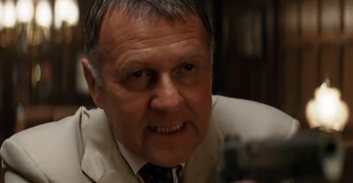
Tossed into the street, Bruce spends the next seven years gaining understanding. Shucking his identity as Gotham’s prince, he travels the world learning about “crime” (in a nebulous sense meant by detectives from the 40s) and the means to fight “injustice.”
Years of this land Bruce inside a Chinese jail, where a man named Heri Ducard (Liam f-ing Neison) steps from the shadows to offer another path. Ducard walks with the League of Shadows, a secretive network of vigilante ninjas headquartered in the mountains of Tibet, led by the mysterious Ra’s al Ghul (“the Demon’s Head”). Passing the Legue’s tests, Bruce balks at the last, which requires him to kill. Rather than execute a murderer in front of the assembled Shadows, Bruce touches off a fire in the League’s powder room, destroying their mountain home. Only he and the unconscious Ducard escape within camera range.
With the League’s lessons in theatricality, invisibility and deception ringing like mental church bells, Bruce Wayne returns to Gotham, finding it much the same: a hive of scum of villainy. Only Alfred and Rachel, the crusading A.D.A., remain unchanged, the only two righteous fools in a city of corruption and decay, where every cop is on someone’s payroll…save for Sergeant Jim Gordon (Gary Oldman).
Alfred’s cooperation (aptly provided by Michael Caine, though with the wrong accent) is essential and unquestioned from the start. There’s no debate between Bruce and Alfred over the course of Bruce’s new-born mission–only its tactics and accouterments. Bruce ignores Rachel until contrived circumstances (that is, the movie’s plot, when it remembers it can’t just be another origin story) force him to remember her. In all the world outside his house, Bruce reaches out to only two men–his father’s old friend in “the Company,” Lucius Fox…and a beleaguered city cop named Gordon, who first dismisses the half-formed vigilante as “some nut”…until mob bosses start showing up unconscious and dangling from street lights like strange fruit.
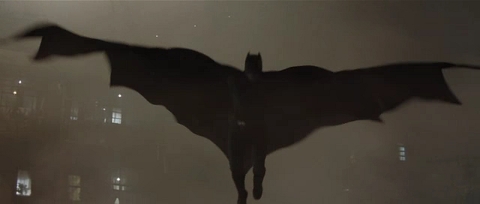
Believe it or not, this is only the first hour of what is more or less two movies unevenly grafted together and packaged as one, much like that first Lord of the Rings cartoon. The first film that goes to make up Batman Begins opens with young Bruce and ends with the fully-formed Batman pulling “Roman” Falcone through a moon roof, announcing, “I’m Batman.” The next hour and twenty minutes trace the ripple effects of this, culminating in the revelation of a plot to (big surprise) destroy Gotham.
Right away I notice a greater respect for the source material than you’ll find in, say, Superman Returns (which shamelessly aped Chris Reeve’s movies while almost completely ignoring the last twenty years of comic books). Canonical characters given short shift in previous flicks – Falcone, Joe Chill, Lucius Fox – are brought to life through dedicated actors that strike precisely the right notes.
Wilkinson’s Falcone is the perfect pre-Bat Gotham gangster – a stereotype so smug in his power he could’ve walked right out of Mario Puzo’s head. Morgan Freeman’s Lucius Fox is an absolutely triumph – for the first time in forty years, Lucius becomes more than Bruce Wayne’s Token Black Dude. Freeman reincarnates the man as another vision of Alfred, another bridge between the Batman and his civilian identity’s past history. Even Oldman’s Gordon receives the opportunity to throw his dramatic weight around and contribute to the outcome, shocker of shockers.
Previously, Gordon played the passive role of a daikaiju movie protagonist, standing around watching the costume men fight from minimum safe distance, if he got there in time at all. I only regret Gordon’s absence from the first half hour of the picture…but considering how much Goyer crammed in, I understand. This is most certainly not an adaption of Frank Miller’s superb Year One book, which told pretty much the same story (minus the grand, Hollywood ending). Nor is this Batman: Mask of the Phantasm, which told the same story in flashback, and with much more heart than Goyer could ever muster.
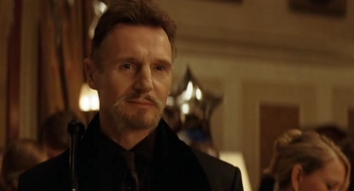
Batman: Year One is a seminal milestone in comics: the first in-depth examination of just what it takes for someone to turn themselves into a vigilante*. It is also the story of a cop from Chicago, attempting to raise his family in what seems to be the worst city in America. Mask of the Phantasm is about the parallel paths taken by a couple of spoiled, crazy, rich children, both of which eventually lead to vengeance, vigilantism and, yes, an explosive Hollywood ending. It’s also the greatest Batman film ever man.
*[About $3.5 million dollars, according to Forbes magazine…but is that “per night”? If so, is that averaged out? Surely stopping Ra’s al Ghul or the Joker requires more overhead than, say, stopping your average mob.]
Caught between those to predecessors, Batman Begins arrives late to its story’s territory and spends its entire first half pissing on bushes. It doesn’t trouble itself overmuch with how to save Gotham, or busy itself with the question, “Is Gotham worth saving.” In the end, story is subordinated to the Dramatic Revelations of the obligatory Ticking Clock. It’s as if the film suddenly remembers there are two Big Name villains mentioned already, and scrambles to wrap things up before the credits.
Ever since Batman Returns the Dark Knight has, for some reason, fought a hopeless battle against Villain Squeezing. Two B-list actors do equal one Jack Nicholson, every time, though this time they went for at least one A list performer (Neason). True, heroes are defined by their villains, but the more you pack into the film the less time you have to develop them. Why include them at all if you don’t plan to utilize their full potential? (Scarecrow, I’m looking at you.) Batman is blessed with one of the best rogues galleries in comics, but on screen this has proved a curse. Try convincing movie makers makers they can’t play with all their toys at once and they get pissy. It’d be like telling Seth McFarland to write jokes that flow from a story, rather than the reverse.
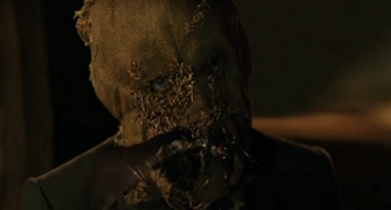
Still, I’ll praise this film for normalizing Batman in a way Tim Burton never tried. Timmy rarely turns his camera on subtle things, or subtle questions. Like, “Where does Batman get those wonderful toys?” (Lucius Fox.) “Why the cape? And why such a cumbersome damn cape, anyway, when you know you’re going to spend most of your nights in hand-to-hand combat?” (Because, apart from completing The Bat-look, it doubles as the coolest parachute in the history of the world.) “Why the little fins on your gauntlets?” (If nothing else, they make handy sword-breakers in a pinch. Never know when you might have to fight a society of ninjas.) “Why Bats, Mr. Wayne?” as Alfred asks.
Bruce comes right out and admits that, “Bats frighten me.” Little human moments allow Bale to portray what’s arguably the most human Batman in decades (if only because the animated Batman, voiced by Kevin Conroy, is just that: animated). Less starkly divided than the Batmen of the 1990s, Bale restores a humanity to Bruce Wayne sure to please those saddened by the character’s more dickish incarnations (I’m looking at you, again, Frank Miller). Can Batman be a selfish, manipulative prick? Yes. But so can anyone. In his heart of hearts, the Batman knows ends do not justify means. Two bullets taught him an object lesson in that at age eight. Bale manages to convey the weight and the tragedy of that while remaining a surprisingly personable masked vigilante…especially for a veteran of Chinese jail, or someone who spent seven years exploring life in the “criminal fraternity.”
Katie Holmes completes the humanization process, totally selling their relationship. Rachel Dawes is a complete new character, though a familiar archetype: the path Bruce will not take. Hers is the only feminine presence in the film, so of course she’s Bruce’s external conscience…and the inevitable kidnap victim…though she kicks a good amount of ass for a damsel in distress. I hereby revise my early mischaracterization: she is no Mary-Jane Watson. More like an anti-M.J., Rachel is the only character (apart from Alfred) who follows Bruce through his entire arch and, unlike Alfred, she is not impressed. At one point she literally sees through Bruce’s mask, a fact I don’t consider spoiled by my sharing it here. Certainly she has an easier job recognizing “her” man than Betty Ross.
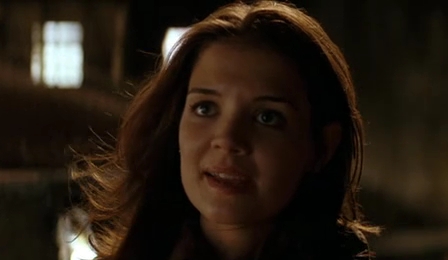
I don’t necessarily recognize him…he’s pretty chatty for a Batman, stopping to share a quip with a homeless man before hauling Roman Falcone off…his Bat-voice sounds more like an emphysema patient’s cough…but I wave these quibbles away. “He’s young,” I say. “He’ll learn.” I could’ve used a few more instances of Bruce getting to know himself and his new suit, in line with the learning curve obviously visible throughout, say, Spider-Man…but I realize this would’ve only made the film longer. Even I think two hours and twenty minutes is pushing it for a Batman movie with such a thin amount of plot.
Better, I think, to have eliminated the top-tier villains (Ra’s al Ghul, the Scarecrow) altogether, building a third act around what the Joker (in the next film) called “the battle for Gotham’s soul.” A sort of civil war with the old guard, represented by the mob, vs. the new world order, in the form of Gordon, the Bat, and all the myriad legions Bruce Wayne is able to inspire, whether in or out of costume. I realize I’m once again advocating a Year One adaption of some kind…but fuck it. I still prefer Rachel Dawes to an entire harem of Frank Miller’s female characters.
And I prefer Batman Begins to just about any live action Bat-film out there…save Returns. Animated film, now…that’s another story.
![]()
![]()
![]()
![]()

I stopped to like Nolan’s Batman films after I read this guy’s insightful Batman reviews…
http://edwardcambro.blogspot.com/2010/11/prologue-to-batman-on-film.htm
http://edwardcambro.blogspot.com/2010/12/batman-on-film-part-1-batman-begins.html
http://edwardcambro.blogspot.com/2010/12/batman-on-film-part-2-batman-1989.html
http://edwardcambro.blogspot.com/2010/12/batman-on-film-part-3-dark-knight.html
http://edwardcambro.blogspot.com/2010/12/batman-on-film-part-4-batman-returns.html
http://edwardcambro.blogspot.com/2010/12/batman-on-film-part-5-batman-mask-of.html
And I never particularly liked Batman Begins until I saw this, from Geekvolution‘s Captain Logan.
In my opinion, Christopher Nolan’s Batman is just as hollow as Frank Miller’s; For them, Batman is a just an angry guy in a suit. I will be watching TDK Rises but I am rather relieved this will be Nolan’s last film.
“Still, I’ll praise this film for normalizing Batman in a way Tim Burton never tried. Timmy rarely turns his camera on subtle things, or subtle questions. Like, “Where does Batman get those wonderful toys?” (Lucius Fox.) “Why the cape? And why such a cumbersome damn cape, anyway, when you know you’re going to spend most of your nights in hand-to-hand combat?” (Because, apart from completing The Bat-look, it doubles as the coolest parachute in the history of the world.) “Why the little fins on your gauntlets?” (If nothing else, they make handy sword-breakers in a pinch. Never know when you might have to fight a society of ninjas.) “Why Bats, Mr. Wayne?” as Alfred asks.”
But stuff like that kills the fantasy of the character. I don’t want Batman to be normal. For example in The Long Halloween, Tim Sale drawing Bats with that ridiculously long Cape was sheer brilliance. It had no other purpose than to look cool.
I didn’t say “normal,” just “normalizing.” That’s the real gag: Nolan’s firing all this over our heads. These movies are no more “for” us than the first four were. And as many comics as Nolan and Goyer may or may not have read, they spend their days in the meatgrinder, no-doubt haunted by constant reminders that “general audiences” don’t know Tim Sale from Tim Story, and greet any mention of superheros with the same bad gay jokes they used in middle school. These are the people Hollywood considers “average” movie goers, toward whom they bend all their truly serious efforts. Hence the technofetishism, which every knuckle-dragger, inside of Warner Brothers or out, can easily understand (and is supposed to sympathize with). The idea of heroism – selfless dedication to abstract goals for the benefit of people our protagonist doesn’t even personally know – is a lot harder for idiots – who were obviously raised without parents or Alfreds – to grasp.
In ’89, Gatling guns and summary executions were the flavors of the month, poured all over Batman to make him “palatable” for that “average” movie-going audience. In the ’60s, it was High Camp. In the 70s, the Camp sank Low, but smatterings of actual, honest-to-God detective work began to creep back into the Bat’s stories. These days, it’s technobable.
None of which is to excuse or invalidate your experience. Frankly, I’ll be happy to see him depart the franchise, too. Hopefully, I’ll cease to find myself in this position, defending Nolan as if I actually cared about his work. As if he were the stand-out, rather than the average. Perhaps his successor will inspire some genuine emotion on my part, pro or con.
I don’t mind pandering to average movie goers when it comes to comic book films. I am just saying if your going to make a “comic book” movie; Why make the material so down to earth? The Dark Knight didn’t feel like a comic book film at all but more like a post 9/11 remake of Michael Mann’s Heat. I am so glad Marvel has not caved into the grim comic book image in their films. I saw Captain America and I loved it and I want to see more films like it; Just enough of the special effects and the characters.
However, speaking in the perspective of a Batman fan, Nolan really has screwed up some of the villians. What happened to poor Ras Al Ghul was a travesty. He went from a mythical cult leader to just a boring guy who’s wife was killed. Then in The Dark Knight, Joker was just too clear headed for his own well being. He ultimate goal was “Joker-esque” but the way he functioned, planting a bomb in all the right places, was too conventional.
You forgot Scarecrow, reduced to the League of Shadows’ butt-monkey in the first film and cosigned to an Introductory Action Scene in the second.
The reason I didn’t mention Scarecrow is because I didn’t have a lot to complain about his personality and motivations. I’ll even overlook the bland costume. Still, you do have a point Dave. I wish Scarecrow was the sole antagonist of Batman Begins. Why couldn’t he alone have rigged all that fear gas to poison Gotham ? I guess Ras and his League of Assassins proved to be more “bang for a buck” in the action department.
Exactly. Also: it’s always handy for the villain to have a ready supply of thugs on hand. Helps to fill out the third act.
Now THIS is an example of how pandering to the general audience annoys me. Scarecrow is a strong enough character to carry the entire film. Hell, the whole theme of the film was about fear so who better to be the sole antagonist ?
So here’s how it is for me: I understand, sympathize and even agree with every one of your criticisms…and I still find myself ensnared by either of Nolan’s Bat-movies every time I see them, without fail. No matter how many times I go in swearing that, this time, I’ll only verify the one stray line of dialogue I need for an off-hand joke, I always find myself ensnared. There are all kinds of movie-watchers, and all kinds of Bat-fans, and we’re all looking for different things. These films provided enough of what I look for to keep me satisfied…for the most part.
But I’ll get to The Dark Knight eventually. I’m still stalking it from the shadows.
I understand. When you see Batman portayed in such a dark fashion, you get hooked. Then looking back it’s always a disappointment. Personally, I don’t I’ll fall for it a third time.
Wanna know the strangest criticism I hear from the un-initiated? That the damn things aren’t dark enough! GAH! Standing in these two worlds is enough to give you a headache.
Some people won’t be satisfied until Batman starts killing people left and right. Go fig.
And we call them “Frank Miller”…or Tim Burton. Ah, crap. Now I’m just digging the hole deeper.
To be honest, I don’t remember Frank Miller’s Batman killing anyone. I know his Bats almost killed the Joker but he couldn’t finish the job.
As for Tim Burton’s Batman, IDK. When he killed people, it didn’t seem like it was generally suppose to be taken too seriously. His Batman as a “killer” never really crossed my mind.
http://gothamalleys.blogspot.com/2010/11/killer-batman.html
http://www.shadowsanctum.net/interactive/tidbits_archive/shadow_batman-movie_comparisons.html
Hmm… I’ll watch The Shadow. More fun.